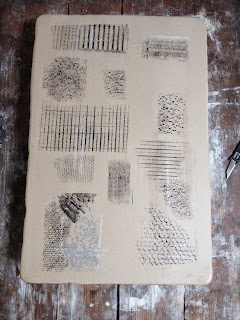Inked up previous landscape stone using 50% litho inks : 50% transparent litho extender - using poppy red and black inks to make a blackcurrant colour-
5 proofs taken on newsprint and 4 on Lambeth cartridge paper -Found that ink was going in places I didn't want it to and hard to control !- Despite using a small 3 inch roller!
? Too much ink
? Stone too wet? Too much extender?
Crimson ink more difficult to handle?!
Inept rollig technique?!
When washed stone down and treated with nap roller and Noir A Monter ink - the ink was much easier to control...
Asked Serena Why ?! - Probably a combination of the above factors -I could also have increased the stiffness of the ink by adding thicker litho extender.
Then rolled on colour onto prints from transfer stone - messing about with translucent and opaque white inks and wet and dry paper - the wet paper seemed to have a big effect producing a more even, denser colour.
Also printed different colours on top of each other to see effects and with the green ink added tack to increase stiffness - was quite difficult to roll!
Print of transfer papers showing various inks monoprinted on top
(translucent / opaque) on damp and dry paper
Blog 21/5/15 - TRANSFER STONE II and mini litho stones
I created new transfer stone - stuck some masking tape down first before placing the transfers to see what effects could be produced. The transfers were created by taking various rubbings onto gum arabic paper using litho crayon and oil pastel from different sources - including the concrete walls of Park Hill, wire mesh, netting, cloths and wall paper
The stone was wetted by dabbing with sponge and then the transfer paper rubbings were placed down quickly on the wet stone then dabbed gently with damp sponge care been taken not to over wet . The transfers were covered with acetate and 7 sheets of newsprint and run twice lightly through the press.The re dampening and running twice was repeated about 4-5 times. The transfers were lifted off and the images carefully dried for about 10 minutes with a hair dryer to warm up the stone (heat softens oils in stone and facilitates absorption of grease ) The stone was then French chalked and gum Arabiced and left to rest until next week.
Transfer stone II with various rubbings and tapes on
I like working on different scales and I found 2 small litho stones about 6 inches square (which were previously used to grain bigger stones) - to use to work on - Filed edges to create a bevel as Serena felt that the biggest problem in working on this small scale would be the inkling up and that the edges of the stone were likely to b a problem!
Next week fine grain these stones and then get drawing on them!
Small 'rescued' litho stones being prepared to work on







